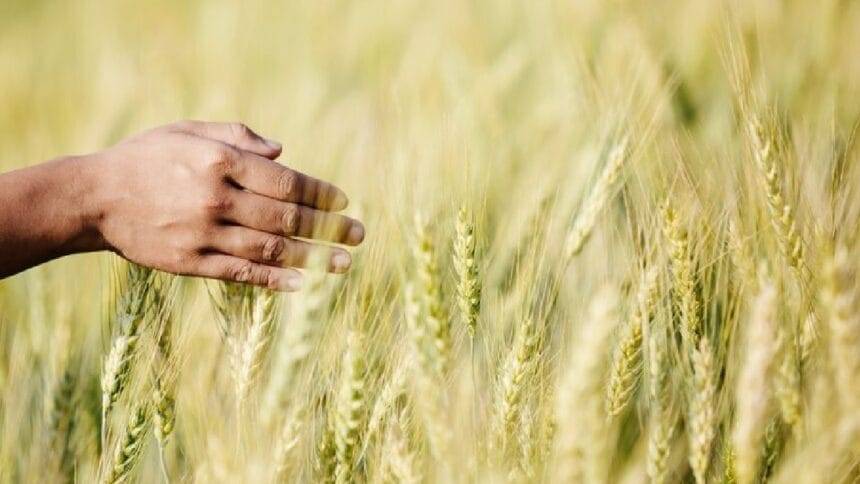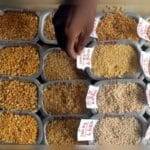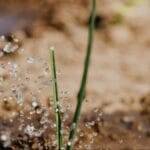Main Points In Hindi (मुख्य बातें – हिंदी में)
-
नए जलवायु-हितैषी गेहूँ की किस्में: भारतीय कृषि अनुसंधान परिषद (ICAR) ने उत्तराखंड के 90,000 किसानों को नए जलवायु-हितैषी गेहूँ की दो किस्में PBW 343 और VL967 देने का निर्णय लिया है, जो रबी सत्र में बोए जाएंगे।
-
किसान फर्स्ट प्रोजेक्ट: ICAR के किसान फर्स्ट प्रोजेक्ट के तहत, बीजों को उत्तराखंड बीज और तराई विकास निगम (UKS&TDC) के माध्यम से किसानों को वितरित किया गया है, जिसमें UKS&TDC किसानों से बाजार दर पर बीजों की दो गुना मात्रा वापस खरीदेगा।
-
उच्च उपज की संभावनाएँ: नई किस्मों से किसानों को plain क्षेत्रों में 60-70 क्विंटल प्रति हेक्टेयर और देहरादून क्षेत्र में 35-45 क्विंटल प्रति हेक्टेयर की उपज प्राप्त हो सकती है, जबकि पारंपरिक किस्मों से केवल 15-18 क्विंटल की उपज होती है।
-
सिंचाई लागत में कमी: नई किस्मों के लिए बुवाई की अवधि 15 से 25 नवंबर तक बढ़ा दी गई है, जो सिंचाई लागत को कम करने में मदद करेगी।
- बीज उत्पादन केंद्र: किसानों के खेतों को बीज उत्पादन केंद्र और प्रयोगशाला के रूप में इस्तेमाल किया जाएगा, जिससे गुणवत्ता वाले बीजों का उत्पादन और परीक्षण संभव होगा।
Main Points In English(मुख्य बातें – अंग्रेज़ी में)
-
Distribution of Climate-Friendly Wheat Varieties: The Indian Council of Agricultural Research (ICAR) has introduced two climate-friendly wheat varieties, PBW 343 and VL967, to 90,000 farmers in Uttarakhand for the Rabi season, aimed at improving sustainable farming practices.
-
Seed Buy-Back Initiative: Under the Farmers First project, the Uttarakhand Seed and Terai Development Corporation (UKS&TDC) will implement a buy-back system, purchasing back double the quantity of seeds from farmers at market rates, promoting seed development and testing.
-
Expected Yield Improvement: These new wheat varieties are projected to significantly increase yields—60-70 quintals per hectare in plain areas, compared to only 15-18 quintals from traditional varieties, thereby enhancing productivity and farmers’ incomes.
-
Ecological and Economic Benefits: The extended sowing period from November 15-25 allows farmers to reduce irrigation costs, making the farming process more cost-effective and environmentally friendly.
- Quality Inputs for Sustainable Farming: Emphasizing the importance of high-quality seeds, the ICAR projects aim to improve agricultural practices, positioning farmers’ fields as seed production centers and laboratories to further facilitate agricultural research.
Complete News In Hindi(पूरी खबर – हिंदी में)


भारतीय कृषि अनुसंधान परिषद (ICAR) ने उत्तराखंड के 90,000 किसानों को रबी सीजन में गेहूं बोने के लिए दो जलवायु-अनुकूल नई गेहूं प्रजातियाँ प्रदान की हैं। ICAR के फार्मर्स फर्स्ट प्रोजेक्ट के तहत, किसानों को एक बाय-बैक सिस्टम के तहत बीज दिए गए हैं, जिसमें उत्तराखंड बीज और तराई विकास निगम (UKS&TDC) इन बीजों का बाजार मूल्य पर दोगुना मात्रा में खरीद करेगा।
भारतीय कृषि अनुसंधान परिषद और भारतीय मिट्टी और जल संरक्षण संस्थान (ICAR-IISWC) ने उत्तराखंड के किसानों को PBW 343 और VL967 नामक विशेष गेहूं की बीजें दी हैं, जो परिष्कृत और वर्षा-आधारित परिस्थितियों के लिए उपयुक्त हैं। फार्मर्स फर्स्ट प्रोजेक्ट के तहत, बीज वितरण UKS&TDC के माध्यम से किया गया है।
भारतीय मिट्टी और जल संरक्षण संस्थान के प्रमुख वैज्ञानिक एम. मुरुगानंदम ने ‘किसान तक’ से बताया कि स्थायी कृषि के लिए गुणवत्तापूर्ण इनपुट और बीज जरूरी हैं। उन्होंने कहा कि 90 किसानों को 21 क्विंटल अच्छे गुणवत्ता वाले गेहूं के बीज दिए गए हैं। इन किसानों के खेत बीज उत्पादन केंद्र और प्रयोगशालाओं के रूप में उपयोग किए जा रहे हैं।
उत्तराखंड बीज खरीद करेगा
एम. मुरुगानंदम ने बताया कि UKS&TDC किसानों से गेहूं की कटाई के बाद उत्पाद खरीद करेगा। इसका मतलब यह है कि किसानों को जो बीज दिए गए हैं, उनकी दोगुनी मात्रा बाजार मूल्य पर खरीदी जाएगी। इससे 42 क्विंटल गेहूं का उत्पादन खरीदने की संभावना है।
मैदानी क्षेत्रों में 70 क्विंटल उपज होगी
डॉ. बैंक बिहारी, ICAR के फार्मर्स फर्स्ट प्रोजेक्ट के प्रमुख वैज्ञानिक ने किसानों को इन गेहूं की विशेषताओं, उच्च उपज और क्षेत्रीय उपयुक्तता के बारे में जानकारी दी। उन्होंने कहा कि मैदानी क्षेत्रों में इन प्रजातियों से 60-70 क्विंटल प्रति हेक्टेयर उपज हासिल की जा सकती है, जबकि देहरादून क्षेत्र में 35-45 क्विंटल प्रति हेक्टेयर उपज हो सकती है।
स्थानीय प्रजातियाँ दोगुना उत्पादन करेंगी
उन्होंने कहा कि किसानों को दिए गए दोनों प्रजातियाँ अधिक उपज देती हैं, क्योंकि पारंपरिक गेहूं प्रजातियों से किसानों को केवल 15-18 क्विंटल प्रति हेक्टेयर उपज मिलती है, जबकि ICAR की नई प्रजातियों का उत्पादन दोगुना है। इन प्रजातियों के बीज बोने का समय 15 से 25 नवंबर तक बढ़ाया गया है, जिससे सिंचाई लागत में कमी आएगी। पिछले वर्षों में भी किसानों को उन्नत गेहूं की प्रजातियाँ दी गई हैं।
यह भी पढ़ें –
Complete News In English(पूरी खबर – अंग्रेज़ी में)
Two climate-friendly new wheat varieties of the Indian Council of Agricultural Research (ICAR) have been handed over to 90 thousand farmers of Uttarakhand for sowing wheat in the Rabi season. Under the Farmers First project of ICAR, seeds have been handed over to the farmers under the buy back system, which Uttarakhand Seed and Terai Development Corporation (UKS&TDC) will buy back from the farmers in double the quantity at the market rate.
Indian Council of Agricultural Research and Indian Institute of Soil and Water Conservation (ICAR-IISWC) have given the best wheat variety PBW 343 and VL967 seeds adapted to irrigated and rain-fed conditions to the farmers in Uttarakhand. Under the Farmers First project of ICAR, seed distribution has been handed over to the farmers through Uttarakhand Seeds and Terai Development Corporation Limited (UKS&TDC).
M Muruganandam, Principal Scientist of the Indian Institute of Soil and Water Conservation (IISWC) and member of the Farmers First Project, told ‘Kisan Tak’ that quality inputs and seeds are essential for sustainable farming. He told that 90 farmers have been given 21 quintals of good quality wheat seeds. The fields of these farmers are being used as seed production centers and laboratories.
Uttarakhand Seeds will buy back
M Muruganandam told that seed distribution Uttarakhand Seeds and Terai Development Corporation Limited (UKS&TDC) Dehradun will buy back the produce from farmers after wheat harvesting. This means that double the quantity of seeds given to the farmers will be purchased at the market price. So that, it can be used for seed development and testing. Through this, more than 42 quintals of wheat produce will be purchased.
70 quintal yield will be available in the plain area
Dr. Banke Bihari, Chief Scientist and in-charge of Farmers First Project of ICAR, informed the farmers about the genetic potential, high yield, and regional suitability of these wheat varieties. He said that a yield of 60-70 quintals per hectare can be achieved in the plain areas from these varieties. Whereas, 35-45 quintals per hectare production can be found in Dehradun area.
Local varieties will yield double
He said that both the varieties given to the farmers give bumper yield, because the farmers are able to get the yield of only 15-18 quintals per hectare from the traditional wheat varieties, and this is only half of the yield of the new wheat varieties of ICAR. There is an extended time for sowing of these varieties from 15th to 25th November. This will reduce irrigation costs. Even in the past years, seeds of improved varieties of wheat have been handed over to the farmers.








